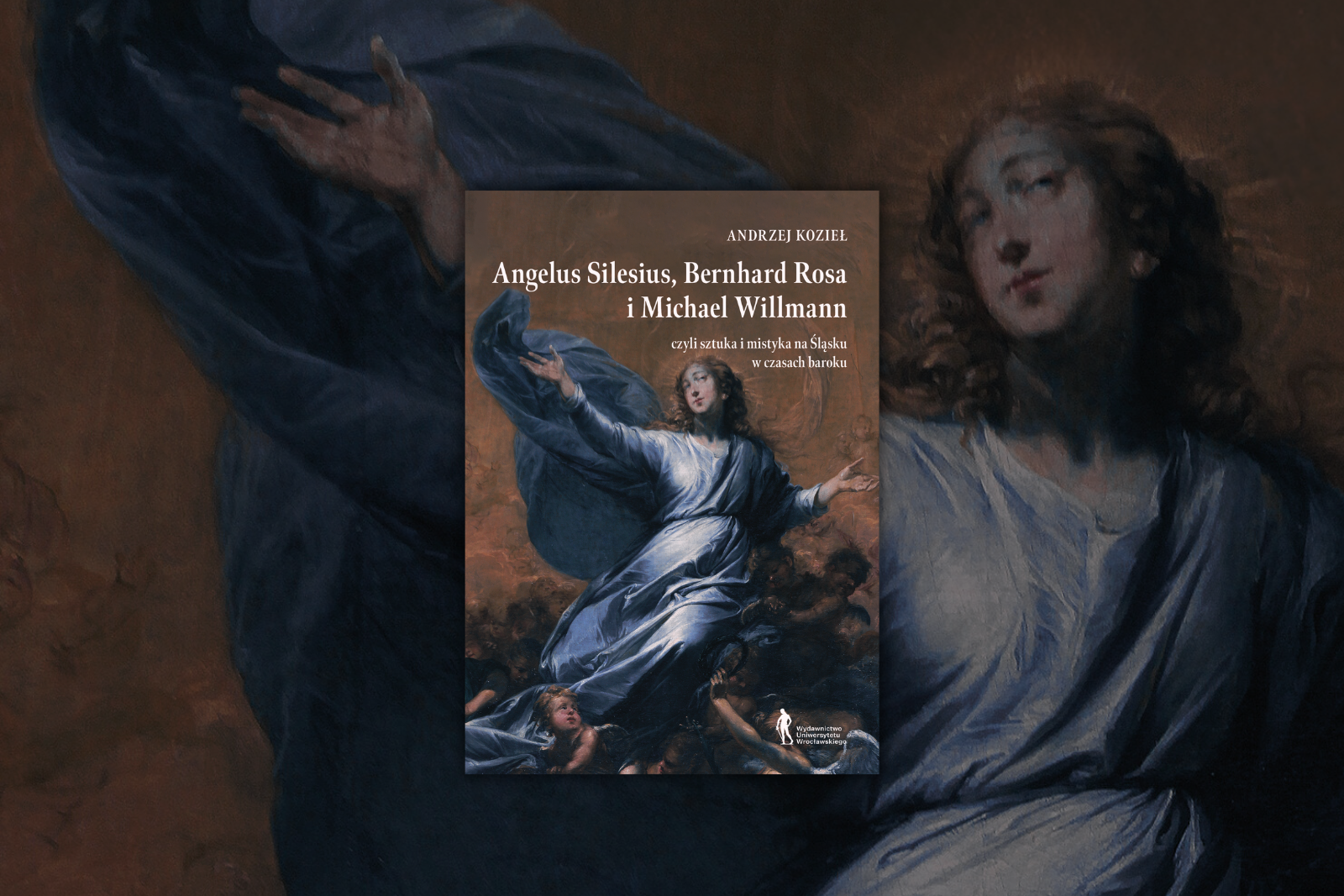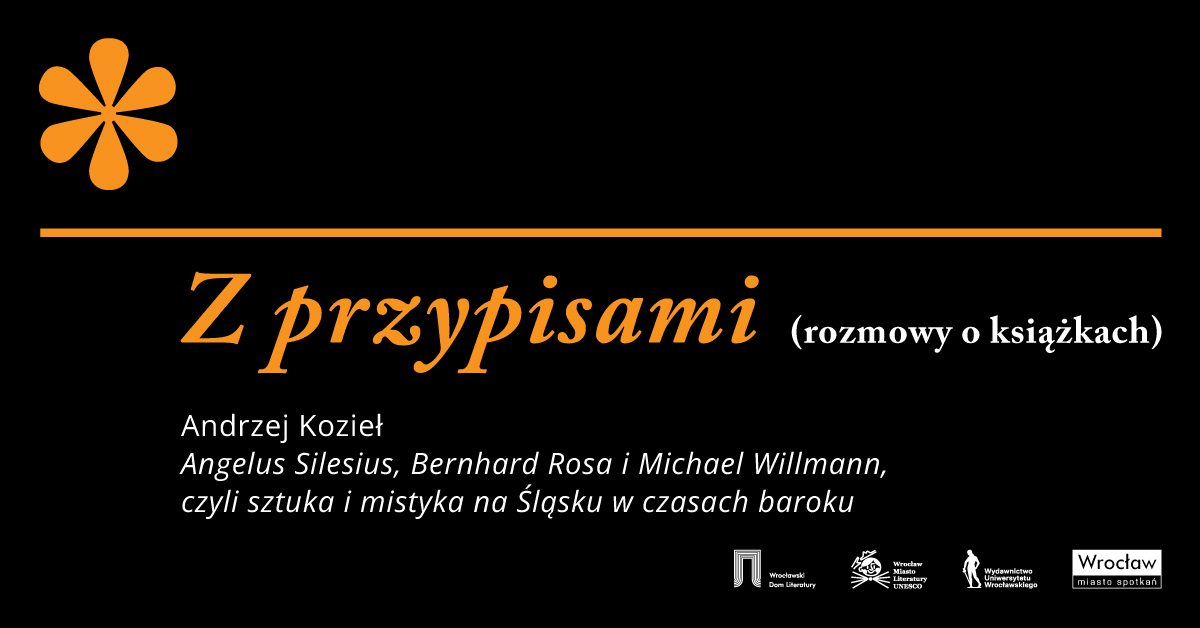
Mondays with WUWr #49
What’s new at the University of Wrocław Press?
In our series #MondayswithWUWr, we keep you up to date with the most important events, book news and issues important to the Publishing House! We also encourage you to follow the wuwr.eu website and the Publishing House’s social media – Fb, LinkedIn and Instagram and YouTube. We encourage you to follow!
University of Wrocław Press and Wrocław House of Literature in a joint series ‘With footnotes’
In April, the Wrocław House of Literature is inaugurating a new series of meetings ‘Z przypisami’. Together with our university publishing house, discussions will be organised around new publications devoted to a wide range of topics in the field of the humanities in the broadest sense. We start with a meeting about the new edition of Andrzej Kozieł’s book ‘Angelus Silesius, Bernhard Rosa i Michael Willmann, czyli sztuka i mistyka na Śląsku w czasach baroku’. The author will take us on a journey to an era when Silesia was the centre of spiritual and artistic Europe.
Three figures who shaped the development of their time play a key role in Kozieł’s story: Angelus Silesius (Johannes Scheffler) – a Protestant who converted to Catholicism, doctor, mystic and poet, whose writings inspired many generations of artists (his works were translated by Adam Mickiewicz); Bernhard Rosa – abbot of the monastery in Krzeszów, who strengthened folk faith through art; and Michael Willmann – a painter known as the Silesian Rembrandt, whose monumental works have become a permanent part of art not only in Silesia. The result of their unique collaboration, which was unprecedented in Europe, was a combination of elements of mystical experience with various forms of mass devotion of a Counter-Reformation character. Importantly, all these forms were closely linked to the use of devotional works of art (paintings, sculptures, graphics), designed mainly by Willmann. They became some of the most popular representations in Silesian religious culture until the end of the 18th century and today we can safely consider them a sensation in European Baroque.
The book is the first comprehensive study of the relationship between art and mysticism in the 17th century, which revives the somewhat forgotten power of Silesian Baroque art.
We cordially invite you to the first meeting of the series – admission is free.
Where: Klub Proza | Wrocławski Dom Literatury (Przejście Garncarskie 2)
When: 14 April 2025, 6 p.m.
You can find the event on Facebook here: Z przypisami: Andrzej Kozieł „Angelus Silesius, Bernhard Rosa i Michael Willmann” | Facebook
And you can purchase this unique publication at wuwr.eu: Angelus Silesius, Bernhard Rosa i Michael Willman czyli sztuka i mistyka na Śląsku w czasach baroku | Wydawnictwo Uniwersytetu Wrocławskiego – aktualnie w promocji!
Spring book and magazine sales at the University of Wrocław at the Faculty of Law, Administration and Economics
This year’s first market, organised at the Faculty of Social Communication and Media Studies, attracted a lot of attention, so we are eager to inform you about the next one. Books and magazines – this time mainly in the fields of law, administration and economics – will be available at exceptional prices this Wednesday, 2 April, from 11:00 a.m. to 2:00 p.m. at the Faculty of Law, Administration and Economics of the University of Wrocław (hall of building D, ground floor). We would like to remind you that you can pay by card during the fair.
WIOSENNY KIERMASZ KSIĄŻEK z WUWr na WPAiE! | Facebook
New: Funkcje polityczne rocznic historycznych w Polsce Ludowej
You can now order a book by Barbara I. Rogowska from the Institute of Political Science entitled ‘Funkcje polityczne rocznic historycznych w Polsce Ludowej (1944–1952)’, which is devoted to the political exploitation and instrumentalisation of historical anniversaries in the years 1944–1952. The author reveals the propaganda behind the system, which assumed the exercise of total power over society – not only its present and future, but also its past.
Already at the end of the Nazi occupation and later during the period of Poland’s subjugation to the Soviet Union, the Polish communists organised the calendar of historical anniversaries in a way that would make it easier for them to rule and introduce a ‘new tradition’ with new heroes and values. Official celebrations of historical anniversaries became a tool for manipulation, and historical memory became a battlefield for the minds of society. By subordinating public space to communist ideology, a narrative was created that promoted a Marxist-Leninist vision of history, the fight against religion, the worker-peasant alliance, and obligatory Polish-Soviet friendship. Poles, recognising the ignorance of national tradition, became immune to historical manipulation. Celebrations, instead of uniting, aroused opposition and resistance. You can read about all of this in this extremely interesting study!
We invite you to the WUWr online bookshop.

Date of publication: 31.03.2025
Added by: M.J.



